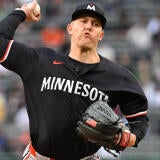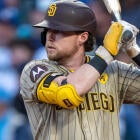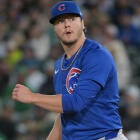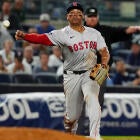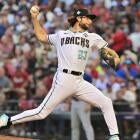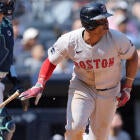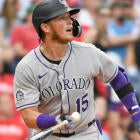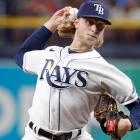The MLB season won't be as long this year. We've known that for months now.
But the latest reports suggest the league can impose a schedule as short as 50 or even 48 games — basically, two months worth.
That's ... nothing. You know how short spring training is? You know how short the playoffs are? Combine the two, and that's about how long the season would be. You couldn't expect stats to normalize. You couldn't trust managers to handle their pitching staffs in conventional ways. It would be total chaos.
OK, that's an overstatement, but randomness would play a larger role, as I outlined in a recent column. And the thing about randomness is there's no predicting where or how it manifests, so I'm not sure how much, if any, our approach to the draft should change.
We gave it our best shot, though, in this here Rotisserie mock, exchanging theories as we drafted. One of the most popular was that high-end closers should be moved up, possibly in the belief they would throw a higher percentage of their team's innings over a shorter season, much like happens in the playoffs. Inning for inning, they tend to be their team's best pitchers, after all, and they wouldn't need their workloads managed as much over a shorter season. If they're handled in a more conventional way, though, the tiny sample size would make for increased volatility, so some made the case for downgrading them.
The biggest change I made was to focus on counting stats for hitters, singling out those who could make a bigger impact over a shorter time. Players who are pretty good across the board, but without a standout category, run the risk of being a non-factor in one or more areas if they're a little slow out of the gate. The league-leader types figure to hit the ground running at what they do best.
So while I'm not especially high on Joey Gallo, I took him with the first pick of Round 6 because I feel like I can trust him to rank among the home run leaders no matter how short the season is. And while he's a liability in batting average, those ratio stats are where randomness will most come into play. He was a .285 hitter through May 24 (or approximately 50 games) last year. Without a full-length season to normalize outcomes, he could hit anywhere from .160 to .330. It's not the stat you should be putting your confidence in.
So who all was making these determinations alongside me?
1) Phil Ponebshek, Patton & Company
2) Michael Florio, RotoBaller (@MichaelFFlorio)
3) Garrett Atkins, Fake Teams (@13atkins13)
4) Frank Stampfl, CBS Sports (@Roto_Frank)
5) Michael Waterloo, The Athletic (@MichaelWaterloo)
6) Alex Fast, Pitcher List (@AlexFast8)
7) Brad Johnson, RotoGraphs (@BaseballATeam)
8) Dan Gilbert, Fantasy Fisticuffs podcast (@DabberDanLit)
9) Chris Towers, CBS Sports (@CTowersCBS)
10) Jesse Roche, Baseball Prospectus (@jaroche6)
11) Andy Spiteri, Fantasy Alarm (@gasdoc_spit)
12) Scott White, CBS Sports (@CBSScottWhite)
Let's see how we did ...
| Round 1 | ||
|---|---|---|
| Pos | Team | Player |
| 1 | Chris Towers | |
| 2 | Brad Johnson | |
| 3 | Scott White | |
| 4 | Jesse Roche | |
| 5 | Andy Spiteri | |
| 6 | Garrett Atkins | |
| 7 | Phil Ponebshek | |
| 8 | Frank Stampfl | |
| 9 | Alex Fast | |
| 10 | Dan Gilbert | |
| 11 | Michael Waterloo | |
| 12 | Michael Florio | |
| Round 2 | ||
| Pos | Team | Player |
| 13 | Michael Florio | |
| 14 | Michael Waterloo | |
| 15 | Dan Gilbert | |
| 16 | Alex Fast | |
| 17 | Frank Stampfl | |
| 18 | Phil Ponebshek | |
| 19 | Garrett Atkins | |
| 20 | Andy Spiteri | |
| 21 | Jesse Roche | |
| 22 | Scott White | |
| 23 | Brad Johnson | |
| 24 | Chris Towers | |
| Round 3 | ||
| Pos | Team | Player |
| 25 | Chris Towers | |
| 26 | Brad Johnson | |
| 27 | Scott White | |
| 28 | Jesse Roche | |
| 29 | Andy Spiteri | |
| 30 | Garrett Atkins | |
| 31 | Phil Ponebshek | |
| 32 | Frank Stampfl | |
| 33 | Alex Fast | |
| 34 | Dan Gilbert | |
| 35 | Michael Waterloo | |
| 36 | Michael Florio | |
| Round 4 | ||
| Pos | Team | Player |
| 37 | Michael Florio | |
| 38 | Michael Waterloo | |
| 39 | Dan Gilbert | |
| 40 | Alex Fast | |
| 41 | Frank Stampfl | |
| 42 | Phil Ponebshek | |
| 43 | Garrett Atkins | |
| 44 | Andy Spiteri | |
| 45 | Jesse Roche | |
| 46 | Scott White | |
| 47 | Brad Johnson | |
| 48 | Chris Towers | |
| Round 5 | ||
| Pos | Team | Player |
| 49 | Chris Towers | |
| 50 | Brad Johnson | |
| 51 | Scott White | |
| 52 | Jesse Roche | |
| 53 | Andy Spiteri | |
| 54 | Garrett Atkins | |
| 55 | Phil Ponebshek | |
| 56 | Frank Stampfl | |
| 57 | Alex Fast | |
| 58 | Dan Gilbert | |
| 59 | Michael Waterloo | |
| 60 | Michael Florio | |
| Round 6 | ||
| Pos | Team | Player |
| 61 | Michael Florio | |
| 62 | Michael Waterloo | |
| 63 | Dan Gilbert | |
| 64 | Alex Fast | |
| 65 | Frank Stampfl | |
| 66 | Phil Ponebshek | |
| 67 | Garrett Atkins | |
| 68 | Andy Spiteri | |
| 69 | Jesse Roche | |
| 70 | Scott White | |
| 71 | Brad Johnson | |
| 72 | Chris Towers | |
| Round 7 | ||
| Pos | Team | Player |
| 73 | Chris Towers | |
| 74 | Brad Johnson | |
| 75 | Scott White | |
| 76 | Jesse Roche | |
| 77 | Andy Spiteri | |
| 78 | Garrett Atkins | |
| 79 | Phil Ponebshek | |
| 80 | Frank Stampfl | |
| 81 | Alex Fast | |
| 82 | Dan Gilbert | |
| 83 | Michael Waterloo | |
| 84 | Michael Florio | |
| Round 8 | ||
| Pos | Team | Player |
| 85 | Michael Florio | |
| 86 | Michael Waterloo | |
| 87 | Dan Gilbert | |
| 88 | Alex Fast | |
| 89 | Frank Stampfl | |
| 90 | Phil Ponebshek | |
| 91 | Garrett Atkins | |
| 92 | Andy Spiteri | |
| 93 | Jesse Roche | |
| 94 | Scott White | |
| 95 | Brad Johnson | |
| 96 | Chris Towers | |
| Round 9 | ||
| Pos | Team | Player |
| 97 | Chris Towers | |
| 98 | Brad Johnson | |
| 99 | Scott White | |
| 100 | Jesse Roche | |
| 101 | Andy Spiteri | |
| 102 | Garrett Atkins | |
| 103 | Phil Ponebshek | |
| 104 | Frank Stampfl | |
| 105 | Alex Fast | |
| 106 | Dan Gilbert | |
| 107 | Michael Waterloo | |
| 108 | Michael Florio | |
| Round 10 | ||
| Pos | Team | Player |
| 109 | Michael Florio | |
| 110 | Michael Waterloo | |
| 111 | Dan Gilbert | |
| 112 | Alex Fast | |
| 113 | Frank Stampfl | |
| 114 | Phil Ponebshek | |
| 115 | Garrett Atkins | |
| 116 | Andy Spiteri | |
| 117 | Jesse Roche | |
| 118 | Scott White | |
| 119 | Brad Johnson | |
| 120 | Chris Towers | |
| Round 11 | ||
| Pos | Team | Player |
| 121 | Chris Towers | |
| 122 | Brad Johnson | |
| 123 | Scott White | |
| 124 | Jesse Roche | |
| 125 | Andy Spiteri | |
| 126 | Garrett Atkins | |
| 127 | Phil Ponebshek | |
| 128 | Frank Stampfl | |
| 129 | Alex Fast | |
| 130 | Dan Gilbert | |
| 131 | Michael Waterloo | |
| 132 | Michael Florio | |
| Round 12 | ||
| Pos | Team | Player |
| 133 | Michael Florio | |
| 134 | Michael Waterloo | |
| 135 | Dan Gilbert | |
| 136 | Alex Fast | |
| 137 | Frank Stampfl | |
| 138 | Phil Ponebshek | |
| 139 | Garrett Atkins | |
| 140 | Andy Spiteri | |
| 141 | Jesse Roche | |
| 142 | Scott White | |
| 143 | Brad Johnson | |
| 144 | Chris Towers | |
| Round 13 | ||
| Pos | Team | Player |
| 145 | Chris Towers | |
| 146 | Brad Johnson | |
| 147 | Scott White | |
| 148 | Jesse Roche | |
| 149 | Andy Spiteri | |
| 150 | Garrett Atkins | |
| 151 | Phil Ponebshek | |
| 152 | Frank Stampfl | |
| 153 | Alex Fast | |
| 154 | Dan Gilbert | |
| 155 | Michael Waterloo | |
| 156 | Michael Florio | |
| Round 14 | ||
| Pos | Team | Player |
| 157 | Michael Florio | |
| 158 | Michael Waterloo | |
| 159 | Dan Gilbert | |
| 160 | Alex Fast | |
| 161 | Frank Stampfl | |
| 162 | Phil Ponebshek | |
| 163 | Garrett Atkins | |
| 164 | Andy Spiteri | |
| 165 | Jesse Roche | |
| 166 | Scott White | |
| 167 | Brad Johnson | |
| 168 | Chris Towers | |
| Round 15 | ||
| Pos | Team | Player |
| 169 | Chris Towers | |
| 170 | Brad Johnson | |
| 171 | Scott White | |
| 172 | Jesse Roche | |
| 173 | Andy Spiteri | |
| 174 | Garrett Atkins | |
| 175 | Phil Ponebshek | |
| 176 | Frank Stampfl | |
| 177 | Alex Fast | |
| 178 | Dan Gilbert | |
| 179 | Michael Waterloo | |
| 180 | Michael Florio | |
| Round 16 | ||
| Pos | Team | Player |
| 181 | Michael Florio | |
| 182 | Michael Waterloo | |
| 183 | Dan Gilbert | |
| 184 | Alex Fast | |
| 185 | Frank Stampfl | |
| 186 | Phil Ponebshek | |
| 187 | Garrett Atkins | |
| 188 | Andy Spiteri | |
| 189 | Jesse Roche | |
| 190 | Scott White | |
| 191 | Brad Johnson | |
| 192 | Chris Towers | |
| Round 17 | ||
| Pos | Team | Player |
| 193 | Chris Towers | |
| 194 | Brad Johnson | |
| 195 | Scott White | |
| 196 | Jesse Roche | |
| 197 | Andy Spiteri | |
| 198 | Garrett Atkins | |
| 199 | Phil Ponebshek | |
| 200 | Frank Stampfl | |
| 201 | Alex Fast | |
| 202 | Dan Gilbert | |
| 203 | Michael Waterloo | |
| 204 | Michael Florio | |
| Round 18 | ||
| Pos | Team | Player |
| 205 | Michael Florio | |
| 206 | Michael Waterloo | |
| 207 | Dan Gilbert | |
| 208 | Alex Fast | |
| 209 | Frank Stampfl | |
| 210 | Phil Ponebshek | |
| 211 | Garrett Atkins | |
| 212 | Andy Spiteri | |
| 213 | Jesse Roche | |
| 214 | Scott White | |
| 215 | Brad Johnson | |
| 216 | Chris Towers | |
| Round 19 | ||
| Pos | Team | Player |
| 217 | Chris Towers | |
| 218 | Brad Johnson | |
| 219 | Scott White | |
| 220 | Jesse Roche | |
| 221 | Andy Spiteri | |
| 222 | Garrett Atkins | |
| 223 | Phil Ponebshek | |
| 224 | Frank Stampfl | |
| 225 | Alex Fast | |
| 226 | Dan Gilbert | |
| 227 | Michael Waterloo | |
| 228 | Michael Florio | |
| Round 20 | ||
| Pos | Team | Player |
| 229 | Michael Florio | |
| 230 | Michael Waterloo | |
| 231 | Dan Gilbert | |
| 232 | Alex Fast | |
| 233 | Frank Stampfl | |
| 234 | Phil Ponebshek | |
| 235 | Garrett Atkins | |
| 236 | Andy Spiteri | |
| 237 | Jesse Roche | |
| 238 | Scott White | |
| 239 | Brad Johnson | |
| 240 | Chris Towers | |
| Round 21 | ||
| Pos | Team | Player |
| 241 | Chris Towers | |
| 242 | Brad Johnson | |
| 243 | Scott White | |
| 244 | Jesse Roche | |
| 245 | Andy Spiteri | |
| 246 | Garrett Atkins | |
| 247 | Phil Ponebshek | |
| 248 | Frank Stampfl | |
| 249 | Alex Fast | |
| 250 | Dan Gilbert | |
| 251 | Michael Waterloo | |
| 252 | Michael Florio | |
| Round 22 | ||
| Pos | Team | Player |
| 253 | Michael Florio | |
| 254 | Michael Waterloo | |
| 255 | Dan Gilbert | |
| 256 | Alex Fast | |
| 257 | Frank Stampfl | |
| 258 | Phil Ponebshek | |
| 259 | Garrett Atkins | |
| 260 | Andy Spiteri | |
| 261 | Jesse Roche | |
| 262 | Scott White | |
| 263 | Brad Johnson | |
| 264 | Chris Towers | |
| Round 23 | ||
| Pos | Team | Player |
| 265 | Chris Towers | |
| 266 | Brad Johnson | |
| 267 | Scott White | |
| 268 | Jesse Roche | |
| 269 | Andy Spiteri | |
| 270 | Garrett Atkins | |
| 271 | Phil Ponebshek | |
| 272 | Frank Stampfl | |
| 273 | Alex Fast | |
| 274 | Dan Gilbert | |
| 275 | Michael Waterloo | |
| 276 | Michael Florio | |
| Chris Towers | ||
|---|---|---|
| Rd | Pk | Player |
| 1 | 1 | |
| 2 | 24 | |
| 3 | 25 | |
| 4 | 48 | |
| 5 | 49 | |
| 6 | 72 | |
| 7 | 73 | |
| 8 | 96 | |
| 9 | 97 | |
| 10 | 120 | |
| 11 | 121 | |
| 12 | 144 | |
| 13 | 145 | |
| 14 | 168 | |
| 15 | 169 | |
| 16 | 192 | |
| 17 | 193 | |
| 18 | 216 | |
| 19 | 217 | |
| 20 | 240 | |
| 21 | 241 | |
| 22 | 264 | |
| 23 | 265 | |
| Brad Johnson | ||
| Rd | Pk | Player |
| 1 | 2 | |
| 2 | 23 | |
| 3 | 26 | |
| 4 | 47 | |
| 5 | 50 | |
| 6 | 71 | |
| 7 | 74 | |
| 8 | 95 | |
| 9 | 98 | |
| 10 | 119 | |
| 11 | 122 | |
| 12 | 143 | |
| 13 | 146 | |
| 14 | 167 | |
| 15 | 170 | |
| 16 | 191 | |
| 17 | 194 | |
| 18 | 215 | |
| 19 | 218 | |
| 20 | 239 | |
| 21 | 242 | |
| 22 | 263 | |
| 23 | 266 | |
| Scott White | ||
| Rd | Pk | Player |
| 1 | 3 | |
| 2 | 22 | |
| 3 | 27 | |
| 4 | 46 | |
| 5 | 51 | |
| 6 | 70 | |
| 7 | 75 | |
| 8 | 94 | |
| 9 | 99 | |
| 10 | 118 | |
| 11 | 123 | |
| 12 | 142 | |
| 13 | 147 | |
| 14 | 166 | |
| 15 | 171 | |
| 16 | 190 | |
| 17 | 195 | |
| 18 | 214 | |
| 19 | 219 | |
| 20 | 238 | |
| 21 | 243 | |
| 22 | 262 | |
| 23 | 267 | |
| Jesse Roche | ||
| Rd | Pk | Player |
| 1 | 4 | |
| 2 | 21 | |
| 3 | 28 | |
| 4 | 45 | |
| 5 | 52 | |
| 6 | 69 | |
| 7 | 76 | |
| 8 | 93 | |
| 9 | 100 | |
| 10 | 117 | |
| 11 | 124 | |
| 12 | 141 | |
| 13 | 148 | |
| 14 | 165 | |
| 15 | 172 | |
| 16 | 189 | |
| 17 | 196 | |
| 18 | 213 | |
| 19 | 220 | |
| 20 | 237 | |
| 21 | 244 | |
| 22 | 261 | |
| 23 | 268 | |
| Andy Spiteri | ||
| Rd | Pk | Player |
| 1 | 5 | |
| 2 | 20 | |
| 3 | 29 | |
| 4 | 44 | |
| 5 | 53 | |
| 6 | 68 | |
| 7 | 77 | |
| 8 | 92 | |
| 9 | 101 | |
| 10 | 116 | |
| 11 | 125 | |
| 12 | 140 | |
| 13 | 149 | |
| 14 | 164 | |
| 15 | 173 | |
| 16 | 188 | |
| 17 | 197 | |
| 18 | 212 | |
| 19 | 221 | |
| 20 | 236 | |
| 21 | 245 | |
| 22 | 260 | |
| 23 | 269 | |
| Garrett Atkins | ||
| Rd | Pk | Player |
| 1 | 6 | |
| 2 | 19 | |
| 3 | 30 | |
| 4 | 43 | |
| 5 | 54 | |
| 6 | 67 | |
| 7 | 78 | |
| 8 | 91 | |
| 9 | 102 | |
| 10 | 115 | |
| 11 | 126 | |
| 12 | 139 | |
| 13 | 150 | |
| 14 | 163 | |
| 15 | 174 | |
| 16 | 187 | |
| 17 | 198 | |
| 18 | 211 | |
| 19 | 222 | |
| 20 | 235 | |
| 21 | 246 | |
| 22 | 259 | |
| 23 | 270 | |
| Phil Ponebshek | ||
| Rd | Pk | Player |
| 1 | 7 | |
| 2 | 18 | |
| 3 | 31 | |
| 4 | 42 | |
| 5 | 55 | |
| 6 | 66 | |
| 7 | 79 | |
| 8 | 90 | |
| 9 | 103 | |
| 10 | 114 | |
| 11 | 127 | |
| 12 | 138 | |
| 13 | 151 | |
| 14 | 162 | |
| 15 | 175 | |
| 16 | 186 | |
| 17 | 199 | |
| 18 | 210 | |
| 19 | 223 | |
| 20 | 234 | |
| 21 | 247 | |
| 22 | 258 | |
| 23 | 271 | |
| Frank Stampfl | ||
| Rd | Pk | Player |
| 1 | 8 | |
| 2 | 17 | |
| 3 | 32 | |
| 4 | 41 | |
| 5 | 56 | |
| 6 | 65 | |
| 7 | 80 | |
| 8 | 89 | |
| 9 | 104 | |
| 10 | 113 | |
| 11 | 128 | |
| 12 | 137 | |
| 13 | 152 | |
| 14 | 161 | |
| 15 | 176 | |
| 16 | 185 | |
| 17 | 200 | |
| 18 | 209 | |
| 19 | 224 | |
| 20 | 233 | |
| 21 | 248 | |
| 22 | 257 | |
| 23 | 272 | |
| Alex Fast | ||
| Rd | Pk | Player |
| 1 | 9 | |
| 2 | 16 | |
| 3 | 33 | |
| 4 | 40 | |
| 5 | 57 | |
| 6 | 64 | |
| 7 | 81 | |
| 8 | 88 | |
| 9 | 105 | |
| 10 | 112 | |
| 11 | 129 | |
| 12 | 136 | |
| 13 | 153 | |
| 14 | 160 | |
| 15 | 177 | |
| 16 | 184 | |
| 17 | 201 | |
| 18 | 208 | |
| 19 | 225 | |
| 20 | 232 | |
| 21 | 249 | |
| 22 | 256 | |
| 23 | 273 | |
| Dan Gilbert | ||
| Rd | Pk | Player |
| 1 | 10 | |
| 2 | 15 | |
| 3 | 34 | |
| 4 | 39 | |
| 5 | 58 | |
| 6 | 63 | |
| 7 | 82 | |
| 8 | 87 | |
| 9 | 106 | |
| 10 | 111 | |
| 11 | 130 | |
| 12 | 135 | |
| 13 | 154 | |
| 14 | 159 | |
| 15 | 178 | |
| 16 | 183 | |
| 17 | 202 | |
| 18 | 207 | |
| 19 | 226 | |
| 20 | 231 | |
| 21 | 250 | |
| 22 | 255 | |
| 23 | 274 | |
| Michael Waterloo | ||
| Rd | Pk | Player |
| 1 | 11 | |
| 2 | 14 | |
| 3 | 35 | |
| 4 | 38 | |
| 5 | 59 | |
| 6 | 62 | |
| 7 | 83 | |
| 8 | 86 | |
| 9 | 107 | |
| 10 | 110 | |
| 11 | 131 | |
| 12 | 134 | |
| 13 | 155 | |
| 14 | 158 | |
| 15 | 179 | |
| 16 | 182 | |
| 17 | 203 | |
| 18 | 206 | |
| 19 | 227 | |
| 20 | 230 | |
| 21 | 251 | |
| 22 | 254 | |
| 23 | 275 | |
| Michael Florio | ||
| Rd | Pk | Player |
| 1 | 12 | |
| 2 | 13 | |
| 3 | 36 | |
| 4 | 37 | |
| 5 | 60 | |
| 6 | 61 | |
| 7 | 84 | |
| 8 | 85 | |
| 9 | 108 | |
| 10 | 109 | |
| 11 | 132 | |
| 12 | 133 | |
| 13 | 156 | |
| 14 | 157 | |
| 15 | 180 | |
| 16 | 181 | |
| 17 | 204 | |
| 18 | 205 | |
| 19 | 228 | |
| 20 | 229 | |
| 21 | 252 | |
| 22 | 253 | |
| 23 | 276 | |
![[object Object] Logo](https://sportshub.cbsistatic.com/i/2020/04/22/e9ceb731-8b3f-4c60-98fe-090ab66a2997/screen-shot-2020-04-22-at-11-04-56-am.png)






